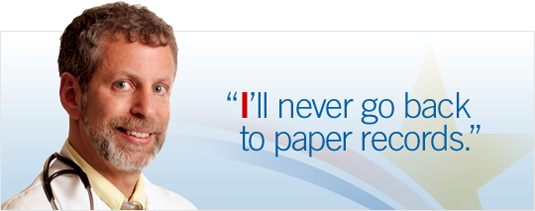Dr. Garber Discusses an Ambitious EHR Rollout


EHRs Mean Better Information, Better Decisions, and Better Care, Says Internist
Index cards were the name of the game when Dr. Larry Garber started practicing medicine more than 25 years ago.
"There were computers—the standard dinosaur computers—and we did have some information on them. But you’d have to walk down to the lab to get the results that were printing out," said Garber.
From 2005 to 2007, Garber, an internist and Medical Director of Informatics at Reliant Medical Group (formerly known as Fallon Clinic) in Worcester, Massachusetts, led an upgrade of the Fallon Clinic's electronic health record (EHR) and practice management technology.
The undertaking was ambitious, to say the least. Reliant Medical Group is a large multi-specialty medical group practice with more than 250 physicians providing primary and specialty services at nearly 30 facilities throughout central Massachusetts.
Today, more than 1,700 Reliant Medical Group employees use the EHR. According to Garber, "None of us would ever go back to paper."
Let’s Do Lunch
Garber’s EHR strategy was bottom-up. He started out by having lunch with many of Fallon's physicians, nurses, and practice managers.
He wanted to learn about the practices—what worked, what didn’t work. Everything. Not just about the computers.
Eventually, however, the conversation turned to the computers—and to the medical records. Everyone agreed: It’s a pain in the neck not to have a record when it’s needed.
"The specialist has the chart when the patient calls, or the specialist complains that the primary care doctor has the chart," recalled Garber. "If we just had this all in one place on the computer, then we could all access it from wherever we are, whenever we need it. And we would not be trying to do medicine without all the information."
After this "discovery" process, Garber held town hall meetings with larger groups of people to drum up support for an electronic overhaul of Fallon's medical records.
"It is so important to have people first of all believe that it is their idea, and then second of all truly understand the value of it, before starting to do what truly is a difficult process," Garber said.
And so the Fallon Clinic EHR was born.
A Kinder, Gentler Rollout
Recognizing the very real barriers physicians face, Garber and his colleagues elected to roll out their EHR in three phases—an approach that was kinder and gentler than an immediate switch from paper one day to computer the next.
The first phase, which lasted for six months, involved implementing an appointment scheduling and professional billing system and displaying read-only clinical information.
The second phase, which lasted another six months, involved implementing paperless telephone messaging. Physicians also learned some basic EHR functionalities, such as how to use their in-boxes, how to enter information, shortcuts for creating notes, and how to order prescriptions.
During this phase, computers were also physically placed in exam rooms. "We just stuck them there. We did not ask them to use them or anything," said Garber. Yet when the implementation team returned six months later to start the third phase, almost all of the physicians had already started using the exam room computers to show patients graphs of their lab results and to renew their prescriptions.
"They were being trained on all of the key functions of the EHR, but the beauty was that they were doing it in their office with no one looking over their shoulder to see how clumsy their typing was. They reached their own comfort level at their own pace until they were ready to perform in front of patients," said Garber.
The third phase was when physicians were taught everything else—how to create notes and do all the ordering and billing in the examination room.
Better Information, Better Decisions, Better Care
Reliant Medical Group has more than one million patient visits each year. The EHR has made these patients’ health care experiences more convenient and satisfying.
All patients have access to a personal health record (PHR) that is integrated with Reliant Medical Group’s EHR. By using the PHR, patients are able to take a more active role in their own health care and streamline their interactions with Reliant Health Group.
For example, they can view test results, schedule appointments, request prescription refills, view health maintenance and immunization status, and read educational materials—all online. And they can exchange secure e-mail with their providers.
It’s not only the care experience but also the care that is better, according to Garber.
"One of the things that physicians in general believe is that we are already doing a great job taking care of our patients, so why bother changing? The reality is that we are not doing as well as we think we are. In a paper world, you can’t identify the patients who are slipping through the cracks and wrongly assume that the number is low," Garber said.
Without the EHR, three of Garber’s own patients might have slipped through the cracks.
Reliant Health Group’s EHR can display prostate-specific antigen (PSA) test results for individual patients over time. The most recent result might be perfectly normal when looked at on its own, but it can signify a dangerous trend when viewed along with previous results.
Garber spotted such a trend in three relatively young patients. All three were later confirmed to have prostate cancer. With the help of the EHR, "I was able to detect this far earlier than I ever would have been able to," said Garber.
Take It from One Who Knows
Reliant Health Group now contracts with the Massachusetts eHealth Institute (MeHI) ![]() —one of 62 Federally-designated Regional Extension Centers—to assist other medical practices interested in making the switch to EHRs.
—one of 62 Federally-designated Regional Extension Centers—to assist other medical practices interested in making the switch to EHRs.
Garber advises other physicians to maintain a long-term vision, learn how to type, and hire staff to pre-load historical, patient-specific medical information into the EHR—so that the data are all there when the EHR goes live.
"An EHR is about making intelligent decisions based on real information," said Garber. And he is optimistic about the future. "Doctors are bright people and make good decisions if they have the right information when they are making their decisions. And let me tell you, 15 years from now, when physicians have been online for 15 years, life is going to be wonderful." And he should know: Reliant Health Group pre-loaded its EHR with 15 years of patient records!


